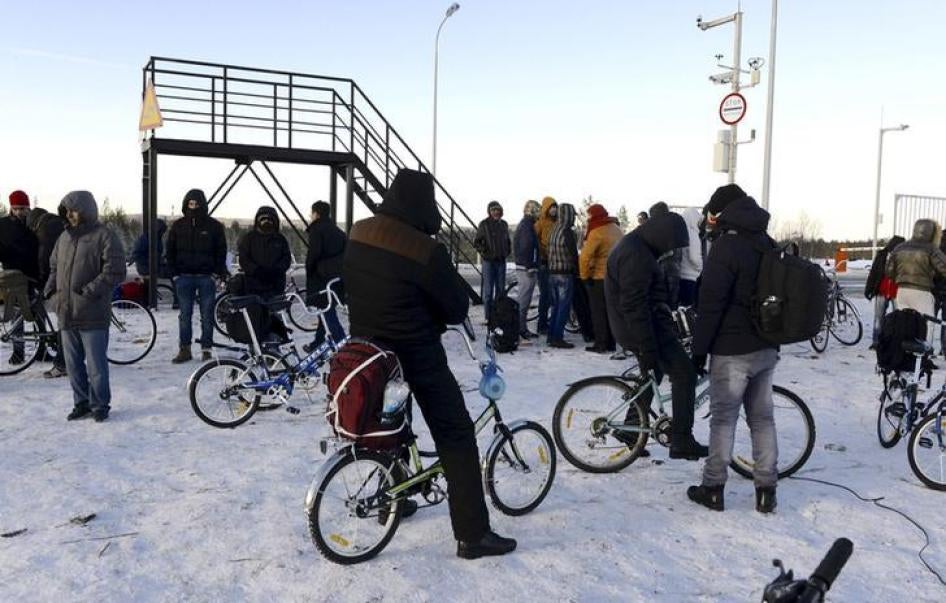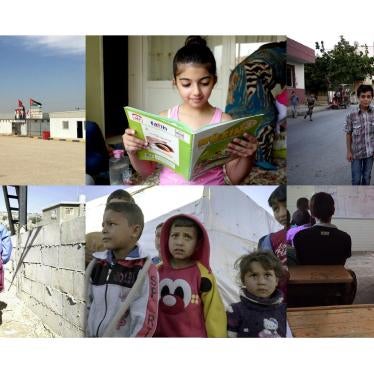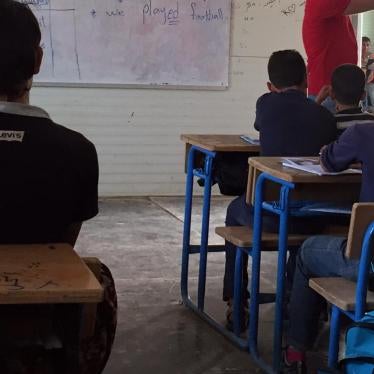(London) – Desperate and vulnerable Syrians need donor countries to step up their assistance greatly, and to match increased aid with action on critical policy reforms in host countries, Human Rights Watch said today. Donor countries will meet in London on February 4, 2016, at the Supporting Syria and the Region conference.
The conference is expected to focus largely on drumming up donations for Syrian refugees and host countries. Human Rights Watch also issued a 14-page report based on research in countries hosting the majority of Syrian refugees. It says that donors should secure commitments from host countries to stop blocking Syrians from fleeing and returning them to a war zone, end harsh registration requirements that are nearly impossible for refugees to meet, and remove obstacles to refugee children’s access to education.
“Host countries in which refugees make up as much as a quarter of the population need vastly more donor assistance, but that money won’t help Syrians who are being pushed back or driven to destitution by harsh policies,” said Bill Frelick, refugee program director at Human Rights Watch. “This conference needs to set a new agenda on Syrian refugees, making respecting their fundamental rights the top priority.”
While recognizing the enormous impact of hosting more than 4.5 million Syrian refugees, donors at the conference should secure commitments from host countries to end practices that violate the prohibition on refoulement, or returning people to countries where they risk serious harm, Human Rights Watch said. Jordan, Lebanon, and Turkey are legally obliged to ensure that people fleeing Syria, including Palestinian refugees and other habitual residents of Syria, are able to seek asylum.
But all three countries have recently restricted entry to refugees from Syria, pushed back asylum seekers, or forcibly returned refugees. In Jordan, thousands of people who entered from Syria have been stuck for months in desert conditions without adequate assistance in a remote demilitarized zone a few hundred meters south of the Syrian-Jordanian border.
Donor countries outside the region that engage in summary pushbacks at their borders, and use other oppressive measures to deter and divert asylum seekers, are in no position to take the moral high ground with front-line states. It is incumbent on donor countries not only to provide sufficient support to meet humanitarian needs of the refugees in the region, but also to demonstrate a commitment to fair treatment of asylum seekers at their borders, Human Rights Watch said.
European Union and other governments should ensure that Syrians and others can present asylum claims at their land borders and ensure access to asylum for those on their territory. Members of the EU, the United States, Australia, Russia, and the Gulf states should also significantly increase the number of Syrian refugees they are willing to accept for resettlement.
At the conference, donors should call on host countries to end harsh registration requirements that most refugees find nearly impossible to meet. Costly and restrictive Lebanese regulations, for example, have barred most refugees from renewing their legal status in Lebanon since January 2015, causing severe harm to their welfare. Refugees without legal status are liable to arrest and often denied access to livelihoods, health care, and education. In May 2015, Lebanese authorities demanded that the United Nations refugee agency stop registering Syrian refugees in Lebanon.
With hundreds of thousands of Syrian children out of school, donors should not only increase funding for education but also work with host countries to lift barriers on access to education. Host countries should relax harmful restrictions on school enrollment, such as requirements that Syrian children produce official school certificates – which many families left behind when they fled Syria. Lebanon and Jordan should revise policies that subject Syrians to penalties, including arrest, for lacking residency status or working without permits.
Such policies contribute to child labor and school dropouts, since impoverished families see children as less at risk if they work than adults. Turkey should fairly and rapidly implement a new policy to allow some Syrians to apply for work permits to support themselves, which could have significant benefits for refugee children. Donors should urge Lebanon and Jordan to make comparable changes that authorize refugees to work lawfully.
“As long as battles rage in Syria, refugees won’t be able to return, no matter how hard life is in host countries or how perilous the journey to Europe,” Frelick said. “Financial pledges are crucial, but an effective response plan that also reforms bad policies is needed to resolve Syrians’ plight.”








